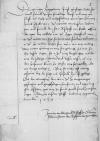 GStA, PK, HBA, C 2, No 77, f. 2r
GStA, PK, HBA, C 2, No 77, f. 2r
Durchlauchter, hochgeborner furst, gunstiger, lieber her unnd frundt. / Unsere fruntliche dienst und was wir sunst vil liebs und wolgefallens vormugen zuvoran. /
Hiemit schicke wir E(wer) Ir(barkei)t cf. Piotr TOMICKI to Ioannes DANTISCUS Cracow, 1534-08-19, CIDTC IDL 1217⌊antwurtcf. Piotr TOMICKI to Ioannes DANTISCUS Cracow, 1534-08-19, CIDTC IDL 1217⌋ von unserm liebenn hern und freunde, dem hern Piotr Tomicki (*1464 – †1535), humanist, statesman, diplomat, one of the most trusted collaborators of King Sigismund I of Poland; 1500-1503 Chancellor of Cardinal Fryderyk Jagiellon, 1502 Gniezno Cantor, Archdeacon of Cracow, 1503-1505 servant of Jan Lubrański, Bishop of Poznań, 1504-1510 Canon of Poznań, 1506 royal scribe, 1507-1519 Grand(?) Secretary, 1509 Canon of Włocławek, 1510-1514 - of Gniezno, 1511 Custos in Kielce and Sandomierz, 1514 Bishop of Przemyśl; 1515 Crown Vice-Chancellor, 1520 Bishop of Poznań, 1523 - of Cracow; from 1524 (at least) General Collector of świętopietrze (Peter's pence), 1509 royal envoy to the Dukes of Pomerania and to Mecklenburg, 1510 - to Wallachia, 1510, 1511, 1512, 1513 - to Hungary (WYCZAŃSKI 1990, p. 268)⌊bischoffe von KrakoPiotr Tomicki (*1464 – †1535), humanist, statesman, diplomat, one of the most trusted collaborators of King Sigismund I of Poland; 1500-1503 Chancellor of Cardinal Fryderyk Jagiellon, 1502 Gniezno Cantor, Archdeacon of Cracow, 1503-1505 servant of Jan Lubrański, Bishop of Poznań, 1504-1510 Canon of Poznań, 1506 royal scribe, 1507-1519 Grand(?) Secretary, 1509 Canon of Włocławek, 1510-1514 - of Gniezno, 1511 Custos in Kielce and Sandomierz, 1514 Bishop of Przemyśl; 1515 Crown Vice-Chancellor, 1520 Bishop of Poznań, 1523 - of Cracow; from 1524 (at least) General Collector of świętopietrze (Peter's pence), 1509 royal envoy to the Dukes of Pomerania and to Mecklenburg, 1510 - to Wallachia, 1510, 1511, 1512, 1513 - to Hungary (WYCZAŃSKI 1990, p. 268)⌋, / uff aus der copei des artikels / Ewr Ir(barkei)t beger betreffend. / Was E(wr) Ir(barkei)t weiter von uns hir inne wirt furdren und wie E(wr) Ir(barkei)t zw willen mugen sein, / erbitt wir uns willig. /
Was newer czeitung an uns sein gelangt, / hab wir hie beÿ lossen legen. / Hot E(wr) Ir(barkei)t ouch dergleichen, / wolde uns die selbige mitteilen / und lossen wissen, ab aus dem zwsamne ko(m)men zw Poznań (Posen, Posnania), city in west-central Poland, Wielkopolska, on the Warta river⌊PosenPoznań (Posen, Posnania), city in west-central Poland, Wielkopolska, on the Warta river⌋ was sol werden / oder wie lange vorlegt etc.
Uns hot ouch nicht wenig erfreuet, / das die sache mit Paul Fasolt (Paul Pasold) (†after 1549-08-13), at least in 1517 burgrave of Liebemühl; 1522-1540 starosta (Hauptmann) of Deutsch Eylau (HARTMANN 1973, No. 1148; AT 14; AT 15; AT 16/1; AT 16/2; AT 17)⌊FasoldtPaul Fasolt (Paul Pasold) (†after 1549-08-13), at least in 1517 burgrave of Liebemühl; 1522-1540 starosta (Hauptmann) of Deutsch Eylau (HARTMANN 1973, No. 1148; AT 14; AT 15; AT 16/1; AT 16/2; AT 17)⌋ hin ist gelegt. / Got der almechtig, / dem wir E(wr) Ir(barkei)t in langweriger gesuntheit und glugkseligem zwnhemen und regirung thun befhelen, / gebe uns in seiner gnade fried zw unsern tagen.
 GStA, PK, HBA, C 2, No 77, f. 2v
GStA, PK, HBA, C 2, No 77, f. 2v  GStA, PK, HBA, C 2, No 77, f. 2r
GStA, PK, HBA, C 2, No 77, f. 2r 
